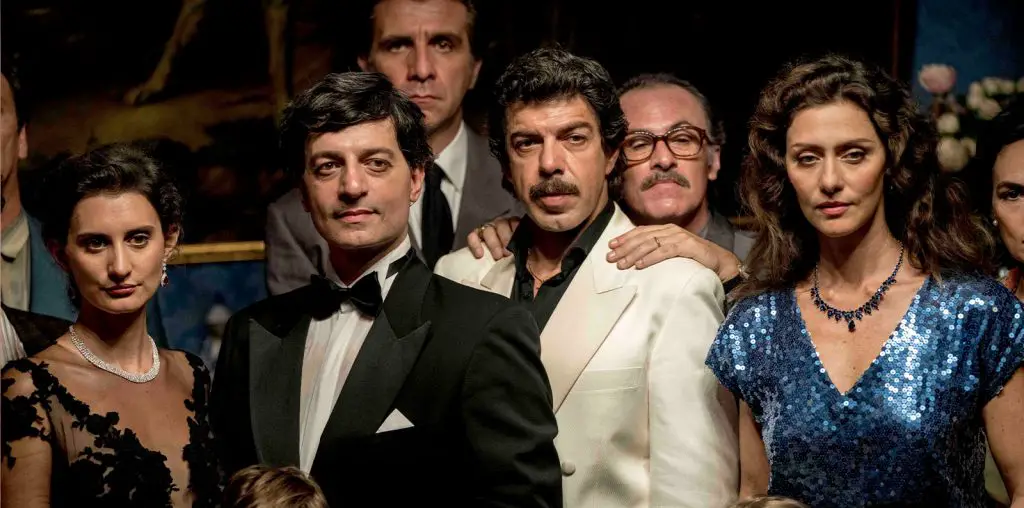
You began your career with thrillers like, “Bad Influence,” and “The Hand That Rocks the Cradle.” Do you have any interest in returning to the thriller genre? ^ I really like suspense movies and I never intended to specialize in them, or make several in a row the way I did. It just so happens that my first really professional job and screen credit was on “The Dunwich Horror,” you know an H.P. Lovecraft adaptation. My first directing job was on a modern horror movie. That happened, not because horror movies were my favorite movies, but my choices were women candy-stripe nurses or a biker movie or a horror movie. I thought the horror movie had more potential for me to express myself. Suspense movies are potentially the most dream-like of any genre. I would certainly make another suspense picture, and hope to someday.
You had wanted to make “LA Confidential” for years. What made you so passionate about that material that it stayed with you? ^ What I had wanted to do for a long time was to make a movie that was set in LA in the fifties. I thought about a lot of different stories to set in that period, and I read a lot of books including half a dozen of Ellroy’s. When I read his novel I said, “This is it.” I set about to get the rights, and I hooked up with Brian Helgeland, my great writing partner, and we did the script, which was a lengthy process. It was a labor of love right from the very beginning.
In the film, Russell Crowe is absolutely frightening as this cop who will stop at nothing. How did you get him to be such a bad a*s? Did he need any motivation? ^ You know, Russell can tap into that side of himself pretty readily. He’s got this force — both force of personality and also ability to just go right to the raw emotion — which is what attracted me to him so much. I always felt that Bud White was a character who was straight from the gut. What helped to get Russell there, was Russell having great clarity about the emotional life of that character. Russell is someone who just has a limitless number of questions about the character, trying to be specific and doubting and wondering. I just did my best to either answer them or to find the answer. The result was he was completely sure-footed when we started. You know, you hear these stories of Russell being “difficult.” Russell is a tricky personality, but it was all about the work. I didn’t have any trouble with him at all.
Kim Basinger is amazing in this movie. How did you two work together? ^ Well, it’s not totally dissimilar to Russell, even though their personalities couldn’t be more different. It’s a matter of trust. Kim turned the part down, and I prevailed upon her agent to set up a meeting with her anyway. In that meeting I just approached it as if she was doing the part, and that she was born to do that part. Told her all the reasons why, and what that character meant thematically and how it connected with her, and she got it. She got it big time, and once she jumped in – she jumped in with her whole heart.
What is it like to win an Academy Award? (Curtis won for Best Adapted Screenplay.) ^ Truthfully, the emotional high was more intense when Kim won hers, than when Brian (Helgeland) and I won. To me it symbolized what I do as a director, which is working with great actors. I felt, in many ways that she was the flag bearer for the whole cast, which I thought were all great. Kim became the standard bearer for all of them.
You were nominated for best director and best picture. What would you have said if you had won for those? ^ I definitely felt like I was the underdog, it wasn’t like I was sitting there ready to bound up and rattle off a memorized speech. We were like David and Goliath against Titanic, but I would have said that I had been blessed with a great cast, and great collaborators, and of course, it started with Ellroy’s book. The fact that I was incredibly lucky, because that picture was 100% independently financed. I had developed it for Warner Brothers, because they owned the book, but they wouldn’t make it the way I wanted it made. Arnon Milchan came in and his company not only put up all the money, but let me cast it the way I wanted. So, I would have acknowledged that.
Where exactly is your Oscar right now? ^ (Laughs) It is on a bookshelf, there’s one cabinet where I keep movie reference books. It is kind of functioning as a bookend, in a way.
Get the whole story and learn about Wonder Boys, Michæl Douglas, Toby Maguire, pink robes and the importance of movie posters in WONDER DIRECTOR: A CURTIS HANSEN INTERVIEW (part 3)>>>
